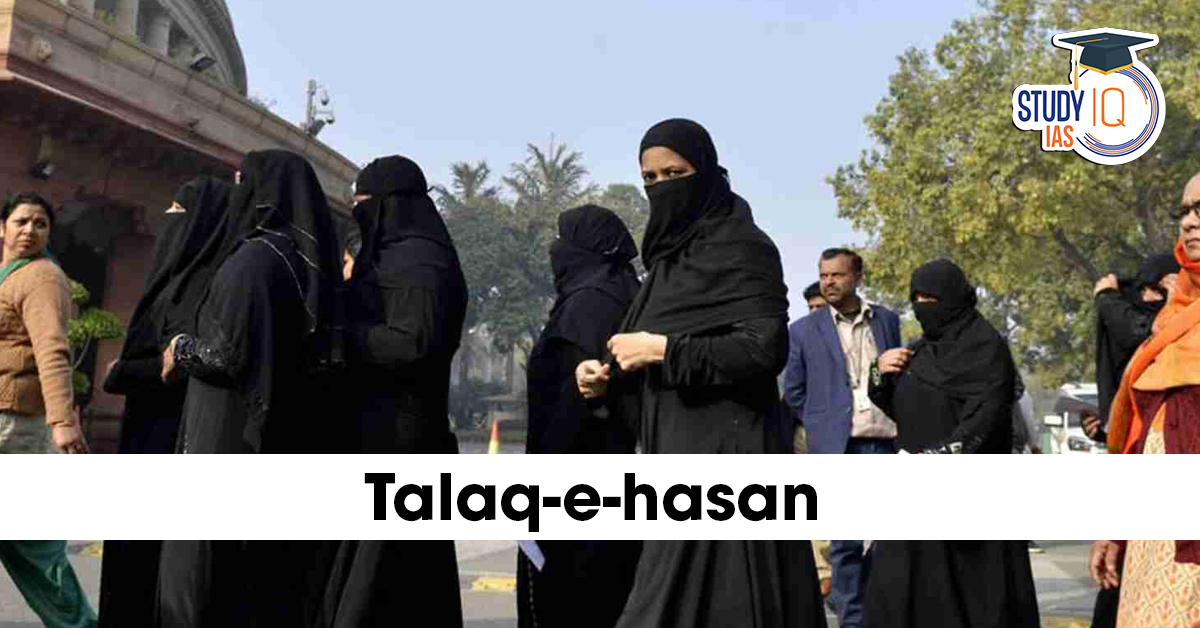Table of Contents
Context: The Supreme Court has recently decided to examine multiple petitions that question the constitutional validity of the practice of talaq-e-hasan.
About Talaq-e-Hasan
Talaq-e-Hasan is an Islamic divorce that enables a Muslim male to terminate his marriage by uttering the word “talaq” (divorce) once every month for a period of three months. It is one of the more “respectable” divorces in Islamic jurisprudence since it contains a period of cooling off and a chance to reunite.
- An extrajudicial form of divorce in Islam, available only to men.
- Considered revocable and recognised as valid under all schools of Muslim law.
- Traditionally approved by the Prophet Mohammad.
- Procedure: Husband pronounces talaq three times, with a gap of one month between each pronouncement.
- The interval between pronouncements is called the period of abstinence (iddat), lasting 90 days.
- If the couple resumes cohabitation or intimacy during iddat, the divorce is automatically revoked.
Process of Talaq-e-Hasan
- First announcement: The husband utters “talaq” once at a time when his wife is not menstruating.
- Waiting period for reconciliation: Following the first announcement, a waiting period (iddat) starts, which takes around three months. If the couple resume living together or intimacy at any time during this waiting period, the divorce is automatically cancelled.
- Follow-up declarations: In case of no reconciliation, the husband utters “talaq” for the second time during the following month and for the third time during the third month.
- Finality: Once the third and last declaration is made, the divorce is final and cannot be revoked.
Legal Status of Talaq-e-Hasan in India
As opposed to the instant triple talaq (talaq-e-biddat), which was held to be unconstitutional by the Supreme Court in 2017 and later criminalised, Talaq-e-Hasan remains a lawfully valid practice under Muslim personal law in India.
But its constitutional validity is now being questioned before the Supreme Court. A group of petitions, mostly filed by Muslim women, contends that the practice is discriminatory in that it can be initiated only by men and thus amounts to an infringement of constitutional rights to dignity and equality. The court has asked for the opinions of national institutions such as the National Commission for Women and the National Human Rights Commission to aid it in its adjudication.
Although men can invoke Talaq-e-Hasan, Muslim women too can obtain divorce, mainly by the method of khula, where they have to offer something to the man in exchange for the cancellation of the marriage.
Difference from Triple Talaq (Talaq-e-Bidat)
- In Triple Talaq, the husband pronounces talaq three times at once, making the divorce instant and irrevocable.
- Talaq-e-Hasan involves a waiting period (iddat) and allows revocation if reconciliation occurs before completion.
- The Supreme Court declared the practice unconstitutional in Shayara Bano v. Union of India (2017), and the Muslim Women (Protection of Rights on Marriage) Act, 2019, subsequently made it a criminal offence.


 Particularly Vulnerable Tribal Groups (P...
Particularly Vulnerable Tribal Groups (P...
 Geo-tagging of Buildings During Upcoming...
Geo-tagging of Buildings During Upcoming...
 Gender Gap in Educational Expenditure in...
Gender Gap in Educational Expenditure in...

























